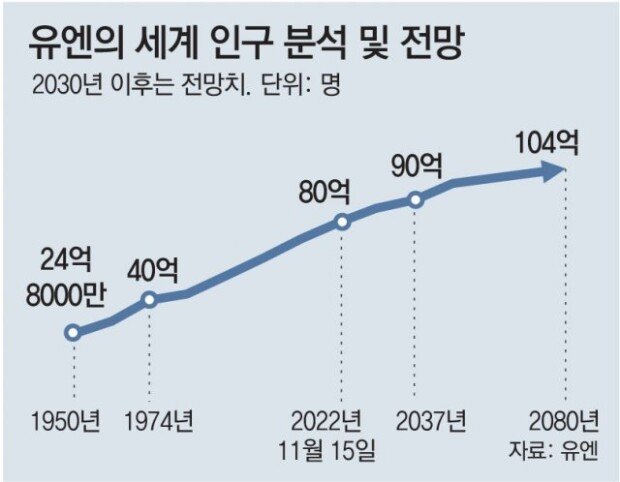Global population hits 8 billion, doubling in 48 years
Global population hits 8 billion, doubling in 48 years
Posted November. 16, 2022 07:40,
Updated November. 16, 2022 07:40

The world’s population has reached 8 billion, up by one billion in just 11 years since the population hit 7 billion in 2011.
On Tuesday, the UNDP announced that the world’s population had hit 8 billion. UN Secretary-General Antonio Guterres said in a statement that it is a “milestone in human development,” and that this is an “occasion to celebrate diversity and advancements while considering humanity’s shared responsibility for the planet.”
Since 1974, when the global population first exceeded 4 billion, the number has increased twofold in 48 years. The UNDP projected that the global population would hit 9 billion in 2037 and 10.4 billion in 2080, thanks to the advancements in public health, nutrition, and medical technology which together extended the average life expectancy.
Of 8 billion people, the Asian population accounted for more than half of the global population. East Asia and Southeast Asia have accounted for 29 percent, with approximately 2.3 billion, and Central Asia and South Asia accounted for 26 percent, with 2.1 billion. India and China recorded 1.4 billion, emerging as the most populous country in the world. India is expected to overtake China as the most populous country next year.
However, the UN World Population Day report said that births have been steadily declining since the early 1960s when the population growth peaked, to below one percent in 2020.
The UN projected that many developed nations would become an aging society. The proportion of the aging population has increased from 7.7 percent in 2010 to 9.8 percent in 2022. “Elderly population will rapidly increase as the people born in the last half-century are getting old,” said UNDP researcher Sarah Hertog. UN also projected that Korea would become a super-aged society, with its population aged more than 65, which accounts for 17.49 percent this year, increasing up to 20.35 percent by 2025. According to the UN, in 2083, people aged more than 65 will account for half of the nation’s population, with 47.4 percent.
chaewani@donga.com







